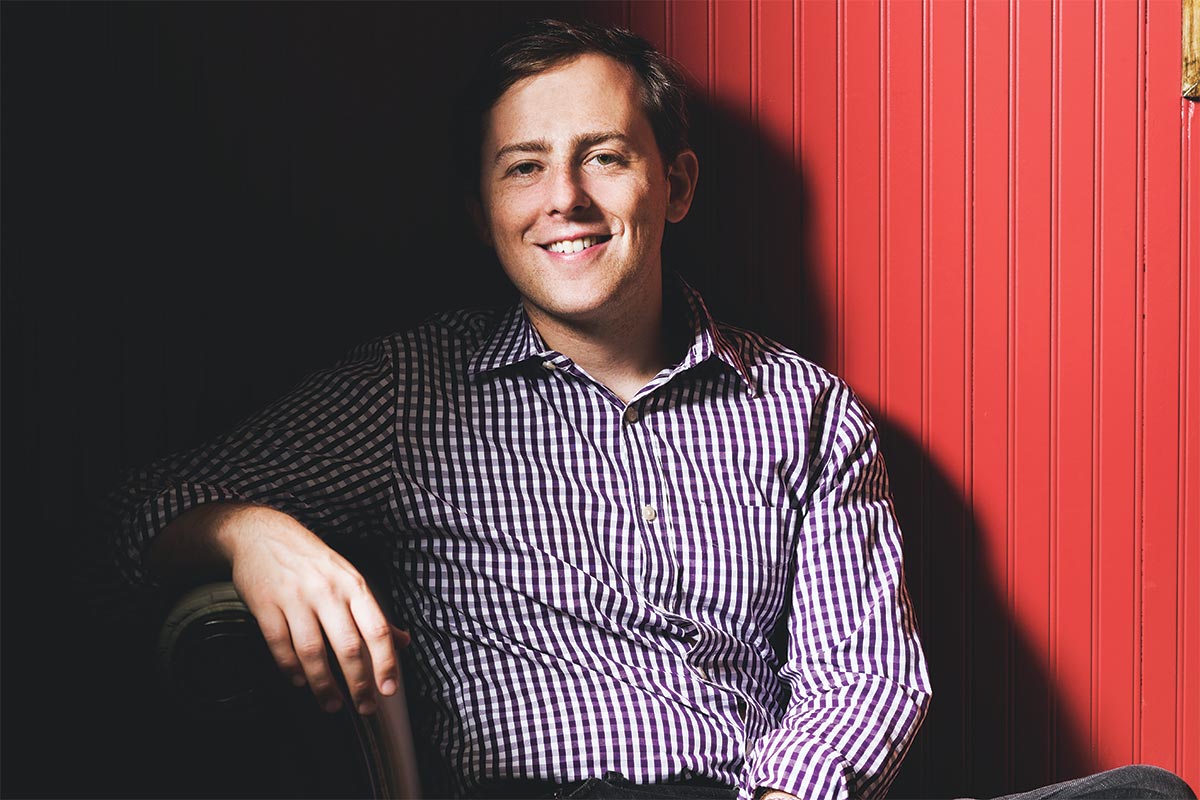
When David Litt was introduced to Barack Obama in the White House Diplomatic Room, the young staffer had no idea he’d be expected to answer questions. So when the president asked him a question—“Hey, David, how’s it going?”—Litt was blindsided. And speechless. “I blacked out,” he recalls.
In the months leading up to that angst-filled first encounter with the leader of the free world, Litt performed his duties at the White House in a state of rapture. The place exuded magic. Backrooms, no matter how shabby or mundane, were brimming with historic significance. Even the restrooms radiated presidential grandeur. Litt fancied that the greatness could rub off on him.
During the summer of 2008, right after graduating from Yale with a degree in history, Litt had canvassed neighborhoods across Ohio to stump for a candidate with whom he, like so many other members of his generation, had become absolutely smitten. In the spring of 2011, at age 24, he joined the Obama White House as a junior staffer. Within five years, he would become a special assistant to the president and senior presidential speechwriter—one of the youngest in American history. His unofficial title would be chief humorist, a niche that placed him in charge of humanizing the president’s message through the art of comedy.
Litt shares his journey in his bestselling memoir, Thanks, Obama: My Hopey, Changey White House Years. Published last fall, the book blends continuous laugh-out-loud hilarity with illuminating reflections on a groundbreaking era. To read Litt’s account is to venture behind the scenes of the White House in the shoes of a keenly perceptive foot soldier caught in the political and cultural upheavals that came to define the Obama years.
In a highly charged environment where even the smallest missteps could unleash a political firestorm, Litt evolves from fledgling timidity to what one reviewer calls “hard-fought wisdom.” His coming of age story is full of pratfalls and overcorrections. Through it all, he wrestles dark forces that threaten to undo his youthful optimism. In this match between angels and demons, it’s often a close game.
At Streets Market Place and Cafe on 14th Street in the District, David Litt, now 31, is sipping coffee on a bar stool while expounding current affairs, both the nation’s and his own. His small frame and boyish looks belie his worldly air. Gazing at him in his jeans and checkered shirt, you might not guess that he once composed words heard ‘round the world, or that he helped animate a chief executive famed for his silver tongue.
Nowadays, Litt is engaged to be married and just broke ground on a new book about how Americans can fix their broken democracy. He also serves as head writer at the D.C. office of Funny or Die, a company that produces political comedy and has over 50 million online followers. Like his stint in the White House, these new endeavors have hopey-changey aspirations. At Funny or Die, he’s harnessing humor as a way to impassion a young electorate.
“Only 12 percent of millennials voted in the 2014 midterm elections,” he remarks. “That’s appalling. It’s one of the reasons Congress doesn’t represent the American people. If more young people voted, we could absolutely have a Congress that was more responsive.” Funny videos featuring bumbling politicians could provide the spark needed to fire up the nation’s youth, he hopes.
Litt finds inspiration in the protest movements gaining momentum across the country. He cites #MeToo, the rallies for DACA and the March for our Lives movement led by high school students who survived the February massacre in Parkland, Florida. That sense of grassroots empowerment “represents the part of America that Barack Obama exemplified,” he says. “It brings back the spirit of 2008.”
Throughout his memoir, Litt concedes that his own spirit has continually faced existential threats. In fact, his recollections are punctuated with a taunting question: “How’s that hopey-changey thing workin’ out for ya?” It’s the voice inside his head of Sarah Palin, asking a question she first posed in 2010. “She’s always doing this,” he reveals, “showing up when my spirits are lowest. It’s like I have a fairy godmother who hates me.”
At one point Litt remarks that “people in Washington talk about disillusionment the way people in high school talk about virginity. Your most mature peers have already gone all the way, you’re told. If you haven’t done it yet, it’s only a matter of time.”
To ward off toxic voices, Litt employs a poignant counter-motif: the triumphant tale of Zoe Lihn, a little girl born with a heart defect. As a toddler in 2012, Lihn appeared onstage with her parents at the Democratic National Convention, becoming an instant poster child for Americans with pre-existing conditions. After Obamacare helped save her life by lifting the lifetime cap on her family’s insurance benefits, Lihn became Litt’s emblem of inspiration.
This tussle between idealism and surrender permeates Litt’s story. Raised in a Jewish family in Manhattan, the son of a doctor and a lawyer, he calls his family a “classic American-dream story.” His early recollections teem with high-minded ideals.
“My great-grandparents fled Russia to avoid being murdered for their religion. Just two generations later, my parents fled New York City weekends for their country house.” He also notes, “I never felt guilty about this because I was raised to believe that America rewards hard work.”
He then waxes Obama-esque: “But I was also raised to understand that luck plays a role in even the boot-strapiest success story. The cost of living the dream, I was taught, is the responsibility to expand it for others.”
In the wake of 9/11, as Litt worried that al Qaeda would kill him before he finished the 10th grade, his ideals were resuscitated by humor. He recalls headlines in The Onion, the comedic newspaper where he would later do an internship, serving up headlines like, “Hijackers Surprised to Find Selves in Hell.” He recalls, “In that awful moment a small satirical newspaper was everything I loved about my country. Defiant. Proud. Optimistic in spite of everything. The Onion gave me hope that I might not die a virgin. What could be more uplifting than that?”
As he got older, he found less to idealize in the realm of politics. President George W. Bush’s fiscal policies and invasion of Iraq dismayed him. Still, there was redemption.
“I didn’t grow up with a high opinion of politicians, but I did grow up in the kind of environment where people constantly told me I could change the world.” With that in mind, he went to work in 2004 on the John Kerry campaign, only to emerge wringing his hands of politics.
Hope was rekindled in early 2008 aboard a flight that was initiating its descent into JFK. Flipping channels on a miniature television screen, the 21-year-old stumbled upon a man in Iowa belting out a victory speech. Litt recognized him as the charismatic keynote speaker at the 2004 Democratic Convention. Some of his friends were already rallying to make him the next president, a prospect Litt found laughable. (With a middle name like Hussein, one might just as well vote for the Tooth Fairy, he reasoned.) But now the dashing young senator was lighting a spark.
“Barack Obama spoke for the next 12 minutes, and except for a brief moment when the landing gear popped out and I thought we were all going to die, I was riveted,” he says.
That summer, after concluding a college career “defined primarily by off-brand vodka and grade inflation,” he hit the road for the swing state of Ohio. In exchange for 16-hour days of unpaid labor, campaign headquarters found him a room “that smelled overwhelmingly of wet dog.” After a few weeks of self-described “indentured servitude,” he was promoted to under-paid organizer.
Following Obama’s stunning victory that fall, the political neophyte languished: “There’s nothing like electing a president and then moving back in with your parents. … On the campaign trail, I was treated like an all-star. In my childhood bedroom, I spent my nights staring at faded summer camp certificates declaring me ‘Most Improved.’”
After receiving an invitation to Obama’s inauguration, the still jobless Litt was inspired to make a move to D.C. But he continued to flounder. An internship at a crisis communications firm, whose mission was to rescue polluters and other corporate scalawags from their legal woes, left him disenchanted. Then, thanks to a few personal connections and a confluence of factors he humbly chalks up to “privilege,” Litt struck gold: an internship at a firm called West Wing Writers, founded by former speechwriters for Bill Clinton and Al Gore. By summer, Litt was a full-time employee. When the firm received a request from the White House to pitch a few presidential jokes for an upcoming Correspondents’ dinner—the annual event that turns presidents into stand-up comedians—Litt gave it a shot. After watching videotape of the tuxedo-clad POTUS delivering a joke he had crafted (a one-liner that he admits wasn’t particularly “genius”), Litt’s bootstraps were on fire.
Still, he had “no illusions” of becoming a presidential wordsmith. But the stars were already aligning. When openings for junior-level speechwriters emerged at the White House, Litt’s bosses—“in an act of remarkable generosity”—submitted his writing samples to David Axelrod, senior adviser to the president, and Chief Speechwriter Jon Favreau. Within days, he became the sole candidate for a job with Senior Adviser Valerie Jarrett—described as “both glamourous and terrifying.”
Recounting his reaction to landing the job, Litt reveals a temptation to portray himself with “retroactive dignity.” Instead he confesses to this: “I rushed back to my apartment, ripped off my suit and jumped up and down in my underwear. I fist-pumped. I hollered the word ‘holy’ and every obscenity I knew. Then I immediately started calling people.”
On the Today show, NBC’s Cynthia McFadden is reminiscing about her featured guest: “Full disclosure,” she says to a panel of smiling ladies, “I’ve known David Litt all his life. His mother was my best friend in law school. When David was about 2 years old, he and I were left alone in a room with a fish tank. I said, ‘Oooh, look at the pretty fish.’ David proceeded to list the Latin names for all the fish.”
Two decades later, the onetime child prodigy would have his wits tested in the pressure-cooker of the West Wing.
He recalls, “I never worked so hard in my life. In the speech-writing world, ‘holding the pen’ means bearing responsibility for a set of remarks. My first week at the White House, I held the pen on seven speeches in five days.”
And there was no margin for error: “If I did my job flawlessly, no one would notice. Fail to properly attribute a quote, however, or omit the ‘L’ from ‘public investment,’ and my mistake would be national news.”
Before long, Litt was having nightmares about senators left unthanked and botched spellings of ‘buenos noches.’ At one point his jaw locked, the result of chronic clenching. “’Yeah, that happens a lot,’’ he recalls one of his co-workers telling him unemotionally. “Just don’t chew for a while.”
Litt also faced external threats to his tranquility, mainly a virulent anti-Obama wave infecting the country. The attacks were often personal. When it came to Obama—whom he depicts as wise, unflappable and steadfastly decent—“there was an endless buffet of otherness to choose from.” He notes that “skin color was just one of many things that made Obama seem so wrong. His big-city background. His youth. His Ivy League degree. His name. The fact that Ludacris was on his iPod and Pat Boone was not.”
On the lighter side, Litt had to contend with family and friends who harbored hyped-up notions about his status in the White House. They would ask things like, “How’s Barack holding up?” Litt was reluctant to point out that after seven months on the job, he and Barack had not even met. He recalls that “Grandpa Irving emailed to ask if ‘my people’ might take a look at his plan for a national network of water pipelines. Uncle Gabe warned me that Obamacare was causing black-market health care clinics to pop up left and right.”
He concedes he couldn’t blame them: “They assumed, just as I had, that the White House is like The West Wing, where everyone hangs out with the president. … But really, the White House is like the Death Star. There are thousands of busy people running around, each trying to make their own little piece of the ship function the way it’s supposed to.”
When Litt finally did meet Obama, it was to review his first full-length presidential speech: that year’s national Thanksgiving address. Despite nearly passing out when the videographer introduced him, Litt was thrilled—so were the relatives back home—for this first splash. But the glory was short-lived. Before the turkey was even carved, the media was raging about a scandalous omission. Obama had failed to mention God. “By any fair measure,” Litt reflects, “this was nonsense. The president had used the word ‘blessing.’ Who did Fox think was handing out those blessings? Oprah?” He returned to work on Monday demoralized and expecting to be shunned, only to learn his colleagues all had Fox News stories of their own.
Later that year, after convincing Favreau to let him tackle the president’s upcoming address to a conference of 5,000 Reform Jews, Litt established what he calls his first White House niche. “I didn’t sit through eight years of Hebrew school for nothing,” he explains. With rich references to Jewish cultural life, the speech was a hit. “Obama speaks Jewish,” an Israeli newspaper proclaimed the next day.
Litt’s optimism continued to wax and wane even after his promotion to a senior staff position during Obama’s second term. On one occasion, Obama mistakenly called him “Lips” while acknowledging another staffer’s praise of his comedic skills. “Lips is funny,” POTUS remarked. Since it wasn’t his place to correct the president, Litt instead embraced the name. “Lips” became an imaginary alter-ego—a speechwriter unabashed by editorial nitpickers or a nation of soul-crushing cynics.
But ambition soon overleapt itself. In composing the president’s remarks for the annual Gridiron dinner, Litt’s bolder version of himself failed to scrutinize the speech from every possible angle. (As with the Thanksgiving address, even Obama, the usually shrewd redactor-in-chief, missed something.) And so, on the evening of the event, the president paid tribute to journalists who “risked everything to bring us stories from places like Syria and Kenya.” Kenyans swiftly responded with outrage at being associated with an infamous regime. In an instant, “Lips” had managed to offend a nation of about 45 million people.
Notwithstanding occasional blunders, Litt was proving his ability to conquer the intellectual rigors of the job. A 2015 address to the NAACP became one of his proudest feats. Blending argument, anecdote and policy details to probe the weighty subject of prison reform, the speech offered bipartisan appeal. “That’s what you always hope will happen in the speech,” he reflects.
As Obama’s comic muse, Litt reveals that the annual White House Correspondents’ Dinner played “an outsize role” in his career. A stand-out moment was the lampooning of Donald Trump in 2012, a year after Obama’s takedown of birtherism with the release of his birth certificate. Speaking before an audience that included the billionaire-celebrity, Obama declared, “Last year at this time—in fact, on this very weekend—we delivered justice to one of the world’s most notorious individuals.” Seconds later, the screens surrounding the podium displayed not the image of Osama bin Laden—but that of “a sneering Donald Trump.”
The feistiest Correspondents’ speech was Obama’s last—the Bucket speech. It began with Obama’s final wishes—his “bucket list”—with its not-so-subtle flipping-off of the tiresome opposition. “Take action on immigration? Buck-et! Let’s go for it. New climate regulations? Buck-et!”
The most memorable part of the speech involved an appearance by comedian Keegan-Michael Key, portraying “Luther, Obama’s Anger Translator.” Key had played that role on Comedy Central alongside Jordan Peele, who impersonated Obama. The skits featured the president delivering a speech with signature calm while Luther hovered in the background, injecting rants that expressed the POTUS’ hidden rage. After alighting with the idea of pairing Key with the real Obama, Litt scripted a legacy moment. Within 48 hours, the clip was viewed 35 million times, becoming the biggest government-produced blockbuster in internet history.
The experience elevated Litt’s faith in the power of humor to lift and redeem, just one aspect of the hard-fought wisdom his journey awarded him. He also learned about transcendence.
“Love,” he says, “is what allows us to be disillusioned and to somehow still believe.”
Nowhere is love more tangible than in the triumph of Zoe Lihn, the little girl whose health care benefits under Obamacare allowed her to undergo multiple open-heart surgeries that saved her life. Toward the end of his story, just as Litt was bracing himself for the greatest blow to his spirit—the inauguration of Donald Trump, whom he calls “America’s imperfections personified”—he visited a karate studio in Phoenix, where he watched 6-year-old Lihn tearing into wooden blocks with a flurry of kicks.
And there he is, restored to a place where love reigns—the hopey-changey spirit of 2008.




